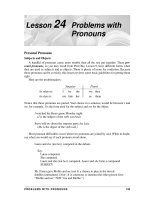Interrogative pronouns
Bạn đang xem bản rút gọn của tài liệu. Xem và tải ngay bản đầy đủ của tài liệu tại đây (14.37 KB, 1 trang )
Interrogative pronouns
The relative pronouns (e.g. who, which, what, whom, whose etc.) which are used to ask questions are
called interrogative pronouns.
The interrogative pronouns may be used to ask:
Direct questions
Who are you?
What do you want?
Whom did you go with?
Whose is this?
Which is your pen?
Indirect questions
I don’t know what she wants.
Tell me whom you want to meet.
Do you know whose coat this is?
The interrogative pronouns may be used in the nominative (subject), accusative (object) or possessive cases.
Who did this? (Nominative)
Whose is this pen? (Possessive)
Whom do you want to meet? (Accusative)
What is your name? (Nominative)
What are you looking at? (Accusative) (Here the interrogative what is the object of the preposition at. A
pronoun used as the object of a preposition should be in its accusative case.)
From the above examples it is clear that:
Who has whose as its possessive case and whom as its accusative case irrespective of the gender.
What and which are used as they are in different cases.
What and which do not have a possessive form.
Whatever, whichever, whoever etc
These words are examples of compound interrogative pronouns. A compound interrogative pronoun can be the
subject or object of the verb in the other clause.
Whoever told you that was lying.
You can marry whoever you like.
He will eat whatever he is given.
Whichever runner comes first will get a prize.
Stay on top of your writing! Download our grammar guide from www.englishgrammar.org to stay up-to-date.
Powered by TCPDF (www.tcpdf.org)









